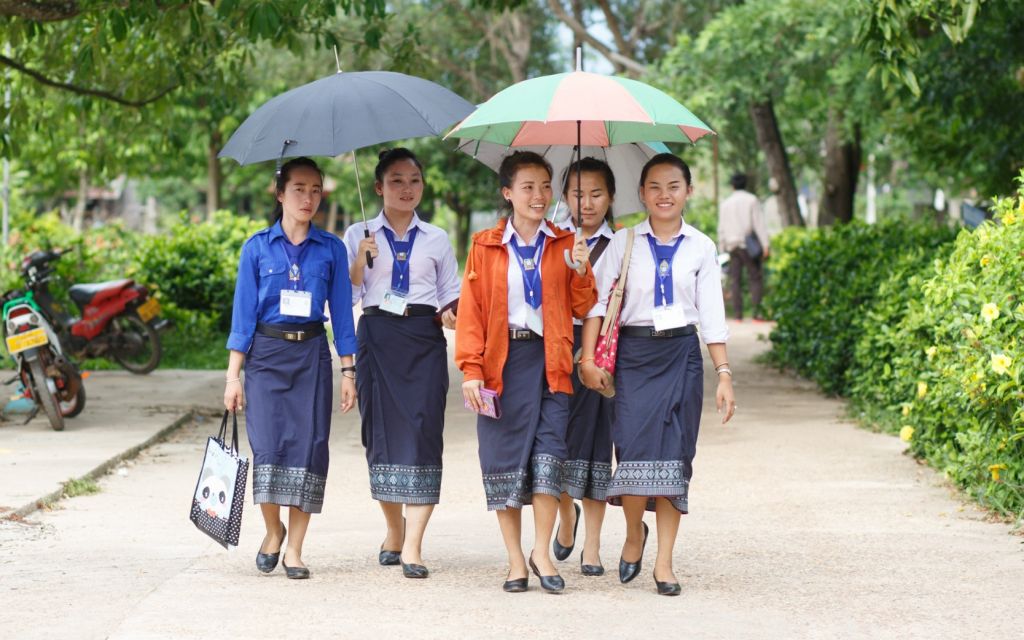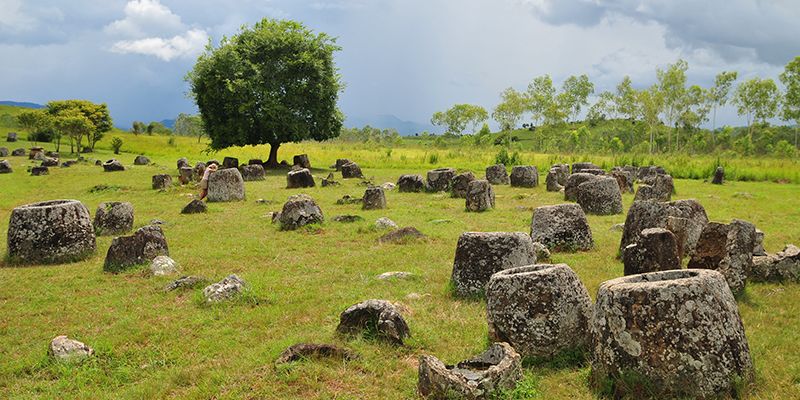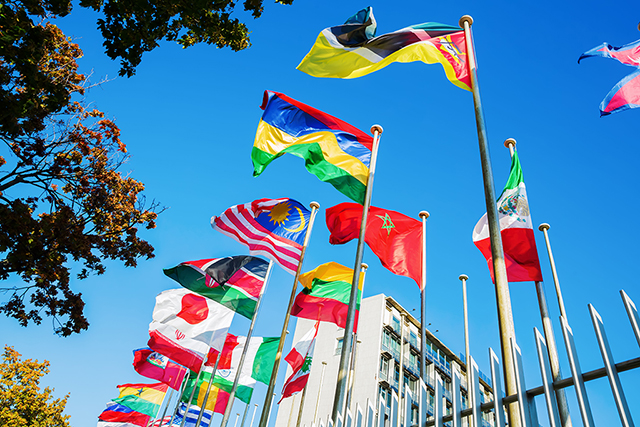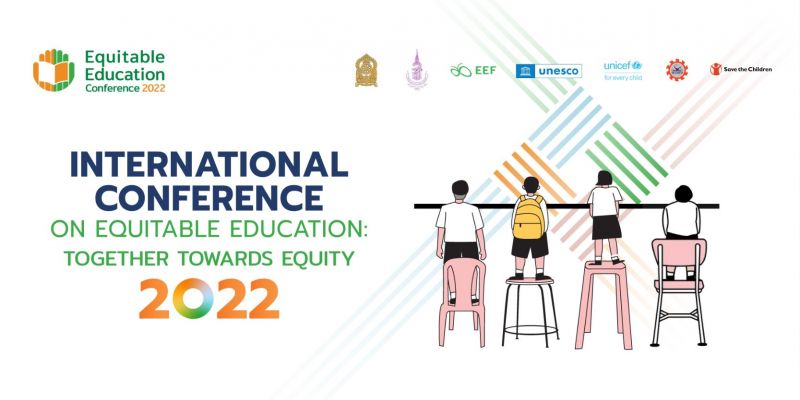UNESCO reports recent achievements and current initiatives in Lao PDR
— UNESCO reports on how the various units of the Bangkok Office – Education, Culture, Natural Sciences, Social and Human Sciences, and Communication and Information – steward a wide array of programmes and events in Lao PDR, both independently and in collaboration with regional partners and related stakeholders. —
UNESCO's support to Lao PDR is based primarily on its expertise and resources in the fields of Education and Culture. One of the Organization’s unique strengths is, however, its ability to draw on expertise and regional programming activities that issue from all of UNESCO’s mandated areas: Education, Culture, Natural Sciences, Social and Human Sciences, and Information and Communication.
In addition, the Organization draws on energies and resources from an expansive global network of UNESCO Institutes and Centres, UNESCO Clubs, the UNESCO Associated Schools Network (ASPnet), and UNESCO Chairs, all of which contribute to the addressing of Asia-Pacific challenges in a multidisciplinary, strategic, and intersectoral fashion.
Selected notable themes to date – categorized here by programme concentration – comprise the following:
Jump to different sections: Education, Culture, Social and Human Sciences, Communication and Information, and Together for Peace Initiative.

1. Capacity Development Support for Teacher Education in Lao PDR. UNESCO supports the Lao PDR Ministry of Education and Sports (MoES) in ongoing comprehensive education sector reform efforts, as well as in the implementation of the Lao PDR Education and Sports Sector Development Plan (ESSDP) of 2021–2025.
UNESCO is a member of the Education Sector Working Group and provides coherent institutional support to the MoES, strengthening Lao PDR’s education sector and systems at all levels.
UNESCO supports the development and updating of teacher education policies and curricula, the enhancing of quality of teaching through teacher training and professional development, as well as the periodic revision of learning materials.
At the policy level, UNESCO provides technical advice for the development of Lao PDR’s first crisis-sensitive, ‘comprehensive, national teacher policy’, which consists of 10 mutually informing dimensions affecting teachers and the teaching profession. The policy will provide important directions in areas of teacher education planning, management, training, monitoring, and supervision, as well as enhance the quality of and working conditions for the teaching force at all levels.

Reinforcing Lao PDR’s Education and Sports Management Information System (LESMIS) for in-service teacher training – following a request from the Department of Teacher Education (DTE) – UNESCO supports the enhancement of the Lao PDR Teacher Education Management Information System (TEMIS), in particular the database for in-service teacher training to support informed and well-coordinated planning for teachers’ professional development, as well as pre-service teacher education to allow for better projections and forecasting of teacher requirements.
UNESCO improves the quality of the teaching force from preschool up to secondary education in Lao PDR, including through the development of a comprehensive teacher policy, as well as by supporting institutions that are providing pre- and in-service teacher training promoting girls' participation and achievements in STEM subjects.
In addition, UNESCO develops the capacity of Provincial Teacher Development Centres (PTDC) in strategic planning, project management, training, and facilitation skills to enable PTDC staff to effectively conduct relevant in-service training of teachers.
In responding to the country’s need for more female participation and achievement in the fields of Science, Technology, Engineering, and Mathematics (STEM), UNESCO enhances the capacity of lower secondary school teachers through nationwide in-service teacher training in applying gender-responsive pedagogies in STEM education in classrooms. Scaling up to pre-service teacher education, UNESCO equips teacher educators in all teacher training colleges in Lao PDR with the knowledge and skills that are necessary to make teaching and learning processes gender-sensitive, as well as prepares prospect teachers to ensure that their teaching and learning processes pay attention to the specific learning needs of boys and girls in STEM-related subjects.
 In response to COVID-19, and with a view to strengthening Lao PDR’s education system to be more inclusive and resilient to such crises, UNESCO supports the development of the ICT Competency Standards for Teachers (ICT-CST) and its integration into pre-service teacher education programmes. In tandem with such support, UNESCO enhances the capacities of teacher educators in 14 teacher education institutions in blended learning modalities that use various appropriate traditional and ICT platforms and tools in their local contexts.
In response to COVID-19, and with a view to strengthening Lao PDR’s education system to be more inclusive and resilient to such crises, UNESCO supports the development of the ICT Competency Standards for Teachers (ICT-CST) and its integration into pre-service teacher education programmes. In tandem with such support, UNESCO enhances the capacities of teacher educators in 14 teacher education institutions in blended learning modalities that use various appropriate traditional and ICT platforms and tools in their local contexts.
Activities are supported by UNESCO’s multi-donor Capacity Development for Education (CapED) Programme.
2. Capacity development of national authorities, school leaders, teachers and youth to develop the Education for Sustainable Development (ESD) country initiative in Lao PDR. UNESCO provides technical advice and capacity development to Lao PDR stakeholders from the Ministry of Education and Sports, Ministry of Natural Resources and Environment, Youth Organization, Provincial Education and Sports Service and teacher representatives to enable a deeper understanding of Education for Sustainable Development (ESD), and to foster dialogue amongst all stakeholders to ensure commitments and collective actions to develop and implement the country initiative for ESD.
3. Increasing Access to Basic Education for Out-of-school Children in Lao PDR through flexible learning programmes. UNESCO engages with and supports the government of Lao PDR in implementing its commitment to provide equitable inclusive educational opportunities for all children in Lao PDR, regardless of their ethnic background or nationality.
UNESCO strengthens the education system and removes obstacles for out-of-school children to ease access to educational opportunities. Following up on the ASEAN Declaration on Strengthening Education Systems for Out-of-School Children and Youth (OOSCY), which was endorsed by Lao PDR at the 2016 ASEAN Summit, UNESCO supports the Government in the implementation of its Decree on Lifelong Learning.
Working in close partnership with the MoES, UNESCO assists children who can’t attend formal education, or who have dropped out of school, to gain an education with qualifications equivalent to those offered by more formal education.
Supported by the Educate a Child (EAC) initiative, UNESCO supports the Department of Non-Formal Education (DNFE) and the Department of General Education (DGE) in their efforts at implementing the Non-Formal Primary Education Programme, as well as the Lower Secondary Education Equivalency Programme. Both programmes annually provide flexible learning opportunities and alternative learning strategies to more than 60,000 youth and adults who are not enrolled in formal education.
In addition, with funding support from EAC, UNESCO, in partnership with DNFE and DGE, supports out-of-school children by equipping non-formal schools with learning materials in Lao PDR’s 15 provinces with the lowest education enrollment, as well as trains teachers and educators for more than 5,000 unreached children, many of which are out of school.
At the policy level, UNESCO supports the work of the DNFE through capacity building, the provision of learning materials, training, study visits, and by promoting the participation of DNFE staff at regional and international capacity development events.
4. Supporting learning needs of children with disabilities in Lao PDR. To ensure that children with disabilities continue their learning during times of emergencies, UNESCO, with financial support from the Global Partnership for Education (GPE), implemented the Accelerated funding to strengthen Global Partnership for Education’s response to COVID-19 project. As part of this initiative, one hundred children’s books were translated into Laotian and adapted to accessible EPUB formats, the latter which can function as supplementary reading resources for learners with disabilities. The books have also been uploaded to UNICEF’s Learning Passport platform, also known as 'Khang Panya Lao', and they will be printed in hard copies. Additionally, an online teacher training course, ‘Responding to Educational Needs of Learners with Disabilities in Emergencies’, has been developed under the same project to build capacities of teachers to support children with disabilities during and after emergency situations. The course is available in Laotian and has been initially pilot tested with 306 teachers from Lao University and MoES. Currently the course is open for enrollment to all interested teachers.

5. Lao Community Radio Project to champion young women and girls’ education. In 2021 – 2022, UNESCO Bangkok and UNDP Lao PDR worked jointly with the Lao PDR Ministry of Information, Culture and Tourism, and the Ministry of Education and Sports, to mitigate the learning crisis triggered by the pandemic among rural minority young women and girls. The project, ‘Championing girl’s and women’s education in COVID-19 recovery through community radio in Lao PDR’, aimed to promote community-based awareness-raising of gender equality issues in, and through, education by fostering community radio programmes led by women.
Working collaboratively with community radio station staff from three remote and linguistically diverse communities in Nakai District in Khammouane, Houne District in Oudomxay, and Ta-Oi District in Salavan, the project engaged young women radio volunteers in knowledge- and skills-building activities aimed at enhancing their understanding of gender, cultural and social norms that act as barriers to girls’ education.
Twelve radio spots were produced and aired in the national language, as well as two ethnic languages, by young women volunteers utilizing various kinds of community radio products, such as interviews, Vox pop (voice of the people), panel discussions, debates, role playing, jingle creation (short songs that are easy to sing along to), and extended storytelling.
The project was also in keeping with the #LearningNeverStops campaign by UNESCO and partners of the Global Education Coalition on COVID-19 education response, to ensure that every girl was able to continue her learning while schools were closed.
Under the framework of Lao PDR's National Policy for Culture, UNESCO focuses its interventions on strengthening national authorities and communities in their ability to safeguard and promote Lao PDR’s tangible and intangible, natural and cultural heritage, and its creative industries. UNESCO's interventions are undertaken in the context of the 1970 Convention on the Means of Prohibiting and Preventing the Illicit Import, Export and Transfer of Ownership of Cultural Property, the 1972 World Heritage Convention, the 2003 Convention for the Safeguarding of the Intangible Cultural Heritage, and the 2005 Convention on the Protection and Promotion of Diversity of Cultural Expressions, to which Lao PDR is a signatory Member State.

1. Building Capacities for the Protection and Sustainable Management of Lao PDR’s Tangible Heritage. As per World Heritage Committee decision 44COM 7B.32, a Reactive Monitoring Mission (RMM) including ICOMOS experts, World Heritage Center representatives, and Culture section representatives of UNESCO Bangkok, took place in April 2022 in Luang Prabang. The mission evaluated the overall state of conservation of the town of Luang Prabang, the implementation of heritage preservation policies and related regulations, the operationalization of the Heritage Fund, assessed proposed projects, and made recommendations on how development projects could take the protection of the Outstanding Universal Value (OUV) of the town of Luang Prabang at early development stages into consideration.
A competence-based institutional assessment process was also conducted in 2022 at the Megalithic Jar Sites in Xiengkhuang – Plain of Jars World Heritage Property, through a detailed self-assessment within the UNESCO Bangkok office, and consultations were held with different district and village stakeholders that share ongoing responsibilities in monitoring the site.
The Plain of Jars Management Plan has been finalized and translated into Laotian as a result of long-term financial and technical support from the French Government. The Management Plan includes various mutually complementary elements, such as a conservation plan and a capacity building plan. Separate but associated Disaster Risk Management guidelines for the site have also been completed, which outlines necessary protocols and actions to be followed in emergencies.
The management plan for Vat Phou and Associated Ancient Settlements within the Champasak Cultural Lanscape World Heritage site has also been updated with closed consultations and collaborations with the Vat Phou World Heritage Site Office, as well as a team of Laotian heritage professionals and resident foreign experts (covering the disciplines of urban planning, architecture, environment, disaster risk management, tourism/community development, archaeology, and mapping).
Under the framework of the 1972 Convention and with financial support from the Convention’s International Assistance Fund, Lao PDR prepared the Hin Nam No World Heritage nomination dossier and developed a transboundary management framework with Viet Nam’s Phong Nha – Ke Bang World Heritage site.
This process received support from the German Corporation for International Cooperation (GIZ).
2. Safeguarding the Living Heritage of Lao PDR. The promotion of living heritage, the diversity of cultural expressions, and the safeguarding of intangible cultural heritage are important pillars of UNESCO’s support of Lao PDR.
At the policy level, since 2013 UNESCO has provided a series of capacity buildings to the Ministry of Information, Culture and Tourism (MoICT), academia, and cultural practitioners including the collaborative development of policies and measures that foster the safeguarding of Lao PDR’s intangible cultural heritage. In emphasizing the critical importance of transmitting intangible cultural heritage and traditional knowledge to future generations, UNESCO advocates for and supports community-based inventorying of intangible cultural heritage in Lao PDR, as well as focuses on creating sustainable livelihoods through intangible cultural practices.
Currently, through UNESCO 2003 Convention International Assistance Funds, community-based trainings were organized province-wide and an inventory as well as safeguarding plan of the intangible cultural heritage elements are being developed in 11 districts and one capital in Luang Prabang province.
Under the framework of the 2003 Convention for the Safeguarding of the Intangible Cultural Heritage, a network of national trainers/facilitators has been established, the members of which are equipped with knowledge and skills to facilitate training on the topic of developing community-based ICH inventories.

3. Supporting and Promoting Lao PDR’s Creative Sector and the Diversity of Cultural Expressions. Under the framework of the 2005 Convention on the Protection and Promotion of the Diversity of Cultural Expressions, UNESCO supports Lao PDR’s cultural and creative industries through a multi-pronged approach which includes the strengthening of national capacity and the provision of policy advice to reinforce Lao PDR’s cultural policy framework. This pertains particularly to those policies that are relevant to Lao PDR’s cultural and creative industries. UNESCO supports mappings of existing policies and legislations that are relevant to the cultural and creative industries, and it assists in identifying challenges and gaps that future policies should address.
UNESCO conducted a baseline study for the creative industries in Lao PDR and developed a roadmap towards the enabling environment for the sector. It also worked with the civil society organizations (CSOs) and set-up a cultural hub, as well as developed a database of artists and creative professionals in different creative fields. Through the cultural hub, creative entrepreneurs not only received trainings in and knowhow of business development, but also learned about policies and measures related to them as artists and how to utilize the Convention as a tool, including how global cultural frameworks and programmes can support their cultural expressions and artistic freedom at the local level.
In 2022 onwards, UNESCO will be supporting the Lao PDR in the development of the Quadrennial Periodic Report (QPR) including capacity building with CSOs in order to participate in development of policies that are related to them.
In the field of Social and Human Sciences, UNESCO supports the government of and the people living in Lao PDR in bridging research and policymaking to enhance sustainable, peaceful, and gender-equitable social transformations, as well as it additionally supports youth-led civic engagement and participation, empowering youth as active citizens and agents of change.
Lao PDR actively participates in regional and sub-regional activities organized by UNESCO and partners, including the Youth and Sport Taskforce, the Asia Indigenous Youth Platform, and the Asia-Pacific Regional Network for National Ethics/Bioethics Committees (the latter in partnership with the World Health Organization).
.jpg)
Strengthening Social Inclusion and Gender Equality in National Youth Policy: UNESCO advocates for and empowers youth in Lao PDR as agents of change, social transformation, peace, and sustainable development. UNESCO further supports Lao PDR young women and men in their addressing of issues in their communities, as well as in their directly contributing to policymaking and the development of government programmes, thereby enabling youth from diverse backgrounds to speak with their own identity and voice.
Working with Lao People’s Revolutionary Youth Union and UN agencies, UNESCO supports the process for developing national youth policy and national youth law in Lao PDR.
In the field of Communication and Information, UNESCO supports marginalized communities in Lao PDR, especially vulnerable women and girls, to raise their awareness of gender and social norms through media development projects. It also supports the government and memory institutions to develop their capacity in preserving documentary heritage at risk, and to increase awareness of valuable archival documents of Lao PDR both in-country and internationally.
Preservation of Documentary Heritage at Risk. UNESCO has collaborated with the Lao National Commission for UNESCO to increase awareness about the significance of documentary heritage, to facilitate its preservation, and to promote its universal, open access. UNESCO has also worked with the Heritage Department under the Ministry of Information, Culture and Tourism (MoICT) to jointly support national capacity building and training of relevant stakeholders, including government officials, archivists, librarians, and museums professionals, to increase national and international awareness about Lao PDR’s rich history and heritage.
UNESCO further supports Lao PDR stakeholders to strengthen their intra-organizational network and engage in regional cooperation through the Memory of the World Regional Committee for Asia-Pacific (MOWCAP). In this context, UNESCO will invite Lao PDR representatives in a regional expert meeting targeting the preservation of documents at risk of natural disasters and threatened by tropical climate conditions in 2023.

This exhibition presented 15 of 274 silent manga entries submitted by artists from 117 countries. Selected entries covered a wide range of peace-related topics, such as out-of-school children, lifelong learning, anti-bullying, conflict, learning to live together, the plight of refugees, global citizenry, and shared cultural heritage and histories. An exhibition catalogue and an online repository of the exhibition have been published, together with a Together for Peace Silent Manga Catalogue Teacher's Companion for teachers who wish to make use of silent manga in their classes.
An English-Lao version of the Teacher's Companion has also been made available. In February 2022, the Lao National Commission for UNESCO organized an online ‘Silent Manga Introduction Meeting’ for UNESCO ASPnet schoolteachers, in which various ways to employ silent manga in classes were considered, including using silent manga as an entry point to make tougher subjects more accessible for their students.







